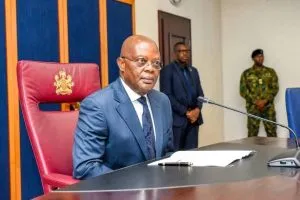Amaechi Denies Offering Wike Commissioner for Finance Role, Claims Wike “Made Himself” Chief of Staff, Governor, Minister, and Chairman

In a recent interview on Arise Television’s Prime Time on June 3, 2025, former Rivers State Governor and Minister of Transportation, Rotimi Amaechi, addressed long-standing claims about his political relationship with Nyesom Wike, the current Minister of the Federal Capital Territory. Amaechi categorically denied offering Wike the position of Commissioner for Finance during his tenure as governor, shedding light on the dynamics of their past alliance and ongoing rivalry. Instead, Amaechi revealed that he appointed Wike as his Chief of Staff to keep him under close supervision, a decision he described as strategic at the time.
Amaechi’s remarks went further, taking a swipe at Wike’s portrayal of his political ascent. He stated that Wike “made himself” Chief of Staff, Governor, Minister, and Local Government Chairman, implying that Wike’s rise to prominence was driven by his own ambition and maneuvering rather than solely Amaechi’s influence. This statement has reignited discussions about the complex and often contentious relationship between the two political heavyweights from Rivers State, who have been at odds for years despite their earlier collaboration.
Conflicting Narratives on Wike’s Political Journey
The relationship between Amaechi and Wike has been a subject of intense debate, with conflicting accounts about their roles in each other’s political careers. While Amaechi downplayed his role in Wike’s rise, some sources, including posts on X, paint a different picture. According to one account, Wike played a pivotal role in Amaechi’s emergence as Rivers State Governor in 2007. It is claimed that Wike was instrumental in securing a landmark Supreme Court victory that overturned the election of Celestine Omehia and installed Amaechi as governor. This legal battle is often cited as a defining moment in Amaechi’s political career, with Wike allegedly serving as a key strategist.
Additionally, a post on X suggests that Wike initially sought the position of Commissioner for Finance under Amaechi’s administration but opted for the role of Chief of Staff instead, a position that offered significant influence over the state’s political machinery. Renowned journalist Reuben Abati has also weighed in on the matter, asserting that Amaechi played a significant role in Wike’s political trajectory. According to Abati, Amaechi facilitated Wike’s appointment as Chairman of the Obio/Akpor Local Government Area, later appointed him as Chief of Staff, and recommended him for the position of Minister of State for Education under former President Goodluck Jonathan’s administration. These claims contrast sharply with Amaechi’s recent narrative, which seeks to minimize his role in Wike’s rise.
A Deepening Political Feud
The public exchange between Amaechi and Wike is the latest chapter in a long-standing political feud that has shaped Rivers State’s political landscape. The two were once allies, with Wike serving as a key figure in Amaechi’s administration. However, their relationship deteriorated, particularly after Amaechi’s defection to the All Progressives Congress (APC) in 2013, while Wike remained loyal to the Peoples Democratic Party (PDP). This rift has since fueled intense political battles, with both figures vying for control and influence in Rivers State.
Amaechi’s recent comments also touched on the ongoing conflict between Wike and the current Rivers State Governor, Siminalayi Fubara. Amaechi alleged that the tension between Wike and Fubara stems from disputes over the sharing of state resources, a claim that has added fuel to the already volatile political climate in Rivers State. In response, Wike accused Amaechi of being “hungry for power” rather than food, a pointed jab referencing Amaechi’s earlier remarks about widespread hunger in Nigeria. Wike’s retort underscores the personal and political animosity that continues to define their interactions.
The Broader Context
The Amaechi-Wike feud is emblematic of the broader power struggles that characterize Nigerian politics, particularly in Rivers State, a region known for its economic significance due to its oil wealth and strategic importance. Both men have wielded considerable influence at the state and national levels, with Amaechi serving as a two-term governor and a federal minister, and Wike holding positions as a local government chairman, governor, and now a key minister in President Bola Tinubu’s administration. Their rivalry has not only shaped their personal legacies but also influenced the political dynamics of Rivers State, with implications for governance and development.
The conflicting narratives surrounding their relationship highlight the complexity of political alliances and betrayals in Nigeria. While Amaechi seeks to distance himself from Wike’s rise, the accounts of others, including political analysts and observers, suggest a more intertwined history. The truth likely lies in a combination of mutual support and individual ambition, with both men leveraging their positions to advance their careers while navigating the turbulent waters of Nigerian politics.
Public Reaction and Implications
The public reaction to Amaechi’s latest comments has been mixed, with some commending his candor and others questioning his attempt to rewrite the narrative of his relationship with Wike. On X, users have shared varied perspectives, with some supporting Amaechi’s claim that Wike’s ambition drove his rise, while others argue that Amaechi’s influence was crucial in providing Wike with the platform to ascend. The debate underscores the polarized nature of political discourse in Rivers State, where loyalties are often divided along factional lines.
As the 2027 elections approach, the Amaechi-Wike rivalry is likely to remain a focal point in Rivers State politics. Their ongoing feud could influence alliances, candidate selections, and voter sentiment in the state. Moreover, the conflict between Wike and Fubara, which Amaechi has now publicly commented on, adds another layer of complexity to the state’s political landscape, raising questions about governance and accountability.
Conclusion
Rotimi Amaechi’s denial of offering Nyesom Wike the Commissioner for Finance role and his assertion that Wike “made himself” a political juggernaut have reignited discussions about their shared history and ongoing rivalry. While Amaechi seeks to downplay his role in Wike’s rise, conflicting accounts suggest a more collaborative past, marked by mutual support and strategic maneuvering. The public spat between these two political titans reflects deeper tensions within Rivers State’s political sphere, with implications for the state’s future. As both men continue to wield influence, their feud serves as a reminder of the intricate interplay of power, ambition, and loyalty in Nigerian politics.






